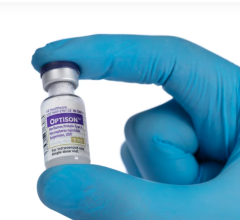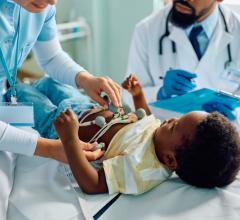
Getty Images
April 24, 2023 — Using powerful sequencing technology, researchers have identified specific biomarker patterns in the blood that are unique to severe COVID-19 infection, as well as others unique to Multisystem Inflammatory Syndrome in Children (MIS-C), a severe complication of COVID-19 infection in children. These findings pave the way for development of potential diagnostic tests in the future, according to a multi-center study published in Cell Reports Medicine. The study includes 416 blood samples from 237 patients at Children's National Hospital, University of California at San Francisco and Emory University/Children's Healthcare of Atlanta.
“Our overall goal is to develop tests that can accurately predict if a child with COVID is likely to develop severe disease, and also accurately distinguish children with MIS-C from children with other causes of fever,” says co-author Roberta DeBiasi, M.D., M.S., principal investigator of the study site at Children’s National and chief of the Division of Pediatric Infectious Diseases there. “These two groups of children can decompensate quickly and require rapid diagnosis and more aggressive treatments right from the beginning.”
MIS-C is a condition where different parts of the body, including skin, mucous membranes, gastrointestinal tract, heart, lungs, kidneys or brain can become inflamed after a COVID-19 infection. Researchers still don’t know why some children develop the condition and why minority children are over-represented in MIS-C cases.
The study is funded by National Institutes of Health’s Eunice Kennedy Shriver National Institute of Child Health and Human Development as part of a national effort to develop approaches to identify children at high risk of developing MIS-C.
The longitudinal analysis included 416 blood samples from 70 patients with acute COVID-19 (mild, moderate and severe illness) and 141 patients with MIS-C across the three hospitals. Blood samples included those that were collected at the beginning of the illness, during initial recovery, one-month after hospitalization and more than three months after illness.
Investigators used a combination of both whole blood RNA (wbRNA) sequencing, as well as cell-free RNA (cfRNA) and cell-free DNA (cfDNA) sequencing of plasma samples to identify key biosignatures. Information from wbRNA is primarily from circulating white blood cells and identifies inflammatory and immune responses to infection. In contrast, both cfRNA and cfDNA can inform about the levels and types of cell death from peripheral tissues.
“wbRNA analyses revealed that although multiple inflammatory pathways were activated in both severe COVID-19 and MIS-C, there were specific patterns that were unique to each disease and distinguish them from mild COVID and other control conditions,” says Meghan Delaney, D.O., M.P.H., co-author and co-investigator of the study at Children’s National. “This finding can be useful in understanding the pathogenesis of the diseases and also in developing a diagnostic test.”
Additionally, cfRNA and cfDNA analysis from MIS-C patients demonstrated distinct signatures of cell injury and death, including endothelial cells, which are the lining of blood vessels, and a type of neuronal cells called Schwann cells, indicating increased levels of organ injury compared to samples from COVID-19 patients.
“To our knowledge, no one has performed comprehensive analysis of both plasma cell-free RNA and whole blood RNA, as well as cell-free DNA in this setting, which is a powerful approach because it gives us different but complementary types of information,” says Dr. DeBiasi.
During the next three years of the four-year grant, researchers will continue working on developing a test that will accurately distinguish MIS-C from other inflammatory conditions affecting children such as Kawasaki Disease, as well as a test which can predict the likelihood of severe COVID-19 infection. Although this may be applied on a research basis in the near future, Dr. DeBiasi says it can take a period of months to years of regulatory reviews before such a diagnostic test could become available commercially.
For more information: www.childrensnational.org
Related Content on MIS-C:
Kawasaki-like Inflammatory Disease Affects Children With COVID-19
Case Study Describes One of the First U.S. Cases of MIS-C
NIH-funded Project Wants to Identify Children at Risk for MIS-C From COVID-19
New Study Looks at Post-COVID-19 Emerging Disease in Children
The Cardiovascular Impact of COVID-19
VIDEO: Example of a Multisystem Inflammatory Syndrome in Children (MIS-C) Pediatric Echocardiogram
NIH-funded Project Wants to Identify Children at Risk for MIS-C From COVID-19
Related COVID-19 in Children Content:
Kawasaki-like Inflammatory Disease Affects Children With COVID-19
Cardiac MRI Aids Evaluation of Children With Multisystem Inflammatory Syndrome (MIS-C) Associated With COVID-19
How COVID-19 Affects the Brain in Neuroimaging
CT Findings of Coronavirus in Children Often Negative
Related COVID-19/Heart Damage Content:
Getting to the Heart of COVID-19 Vaccination and its Cardiovascular Risks
COVID-19 Surges Linked to Spike in Heart Attacks
COVID-19 Fallout May Lead to More Cancer Deaths
Kawasaki-like Inflammatory Disease Affects Children With COVID-19
FDA Adds Myocarditis Warning to COVID mRNA Vaccine Clinician Fact Sheets
CMS Now Requires COVID-19 Vaccinations for Healthcare Workers by January 4
Cardiac MRI of Myocarditis After COVID-19 Vaccination in Adolescents
Small Number of Patients Have Myocarditis-like Illness After COVID-19 Vaccination
Overview of Myocarditis Cases Caused by the COVID-19 Vaccine
Case Study Describes One of the First U.S. Cases of MIS-C
NIH-funded Project Wants to Identify Children at Risk for MIS-C From COVID-19


 May 19, 2025
May 19, 2025 









